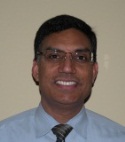
In July 2023, we changed our name from AACC (short for the American Association for Clinical Chemistry) to the Association for Diagnostics & Laboratory Medicine (ADLM). The following page was written prior to this rebranding and contains mentions of the association’s old name. It may contain other out-of-date information as well.
1998 Outstanding Scientific Achievements by a Young Investigator
Uttam Garg, PhD, will receive the 23rd annual award, sponsored by Boehringer Mannheim Corp. Dr. Garg is the Director of Clinical Chemistry and Toxicology Laboratories of The Children’s Mercy Hospital in Kansas City, Missouri, and Associate Professor of Pediatric Pathology at the University of Missouri-Kansas City School of Medicine. Born in Punjab, India, in 1962, he received his BS from the Punjabi University, with honor and distinction. He received his PhD in 1987 from the Postgraduate Institute of Medical Education and Research, Chandigarh, India, under the supervision of Dr. Nirmal K. Ganguly, the Director of the Indian Council of Medical Research, and Dr. Rakesh Bhatnagar, Professor of Biotechnology at the Jawaharlal Nehru University, New Delhi. For his doctoral dissertation, Dr. Garg studied the effect of passive and active immunization with pili of Escherichia coli in the prevention of ascending pyelonephritis. He used the transport of glucose and amino acids, and renal brush border membrane enzymes as sensitive biochemical markers of renal damage to assess the protective effect of immunization with pili. For his graduate work, he was awarded the Major General Amir Chand Gold Medal, the highest research honor awarded by the institute.
Dr. Garg did his postdoctoral training at the New York Medical College in Pharmacology and Cell Biology under the direction of Dr. Aviv Hassid, currently Brownstein Professor of Cardiovascular Physiology at the University of Tennessee. During his postdoctoral training Dr. Garg received an American Heart Association Fellowship to study the role of nitric oxide and atrial natriuretic factor in the regulation of smooth muscle cell growth. Along with his mentor, he demonstrated that nitric oxide and cyclic GMP inhibit smooth muscle and mesangial cell growth and proliferation induced by serum and various growth factors, such as platelet-derived growth factor, epidermal growth factor, insulin-like growth factor, and fibroblast growth factor. They also demonstrated that nitric oxide exerts its effect both through and independent of cyclic GMP. At the New York University Medical Center, Dr. Garg, along with Dr. Mylar Bansinath, demonstrated the role of nitric oxide in the regulation of glial cell proliferation; he was awarded FIDIA Research Foundation Travel Award to present his findings at a symposium entitled, “Excitatory Amino Acids”, held in 1992 at Yosemite Park, California.
Dr. Garg completed his Clinical Chemistry Fellowship at the University of Minnesota Medical School in Minneapolis under the direction of Drs. John Eckfeldt and Michael Tsai. After completing the fellowship, he continued his stay at the University of Minnesota Medical School in Minneapolis as an Assistant Professor. Along with Dr. Eckfeldt as the Principal Investigator, Dr. Garg contributed to NHLBI-funded research grants, “Family Heart Study-Central Laboratory” and “Hypertension Genetics-Biochemistry Laboratory” as a co-investigator. The research group studied various cardiovascular risk factors, including homocysteine, lipids, factor V, and apolipoprotein E. During his stay at the University of Minnesota Medical School, Dr. Garg was awarded a Van Slyke Society Research grant entitled, “Approaches to Identify Homocystinuria Heterozygotes” from the American Association for Clinical Chemistry (AACC). He received the Richard Marshall travel award from the Midwest Section of Clinical Chemistry and a travel award from AACC to present his findings. In addition, he developed several methods for clinical use, including a molecular assay for the diagnosis of hereditary hemochromatosis, an assay for cystathionine ß-synthase in cultured fibroblasts, a methionine loading test for the diagnosis of heterozygosity of homocystinuria, and a method for molecular diagnosis of sickle cell disease using microextracted DNA from Guthrie cards.
Dr. Garg has published 40 peer-reviewed research papers and has presented his work in various national and international meetings. His research work has been cited in >1000 publications, including several citations by Nobel Laureate Dr. John Vane. He has peer-reviewed research papers for several scientific journals, including Clinical Chemistry, Neuroscience, and Life Sciences. Dr. Garg is certified in clinical chemistry by the American Board of Clinical Chemistry and the American Society of Clinical Pathology. His major research interest is in the development of methods for clinical laboratories.